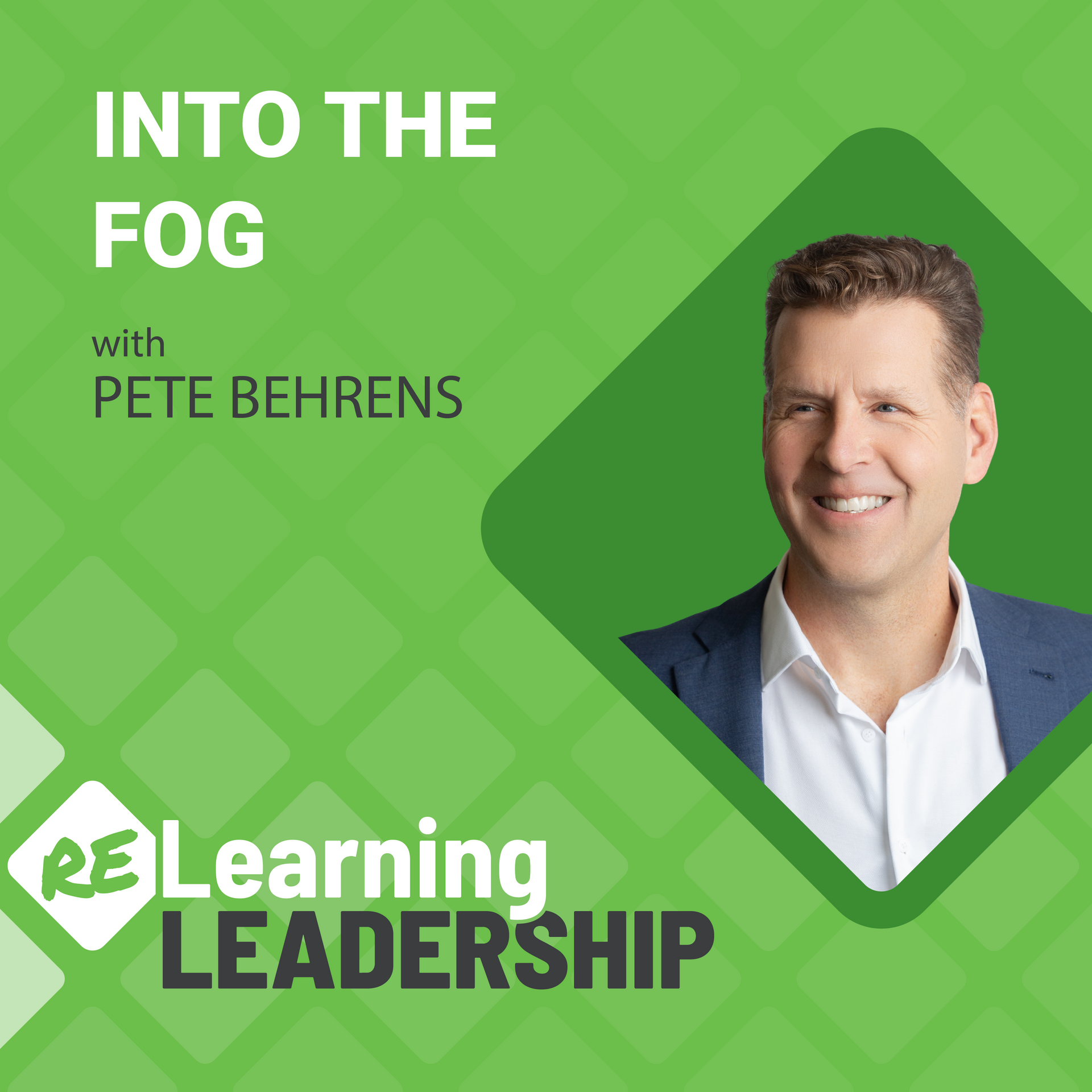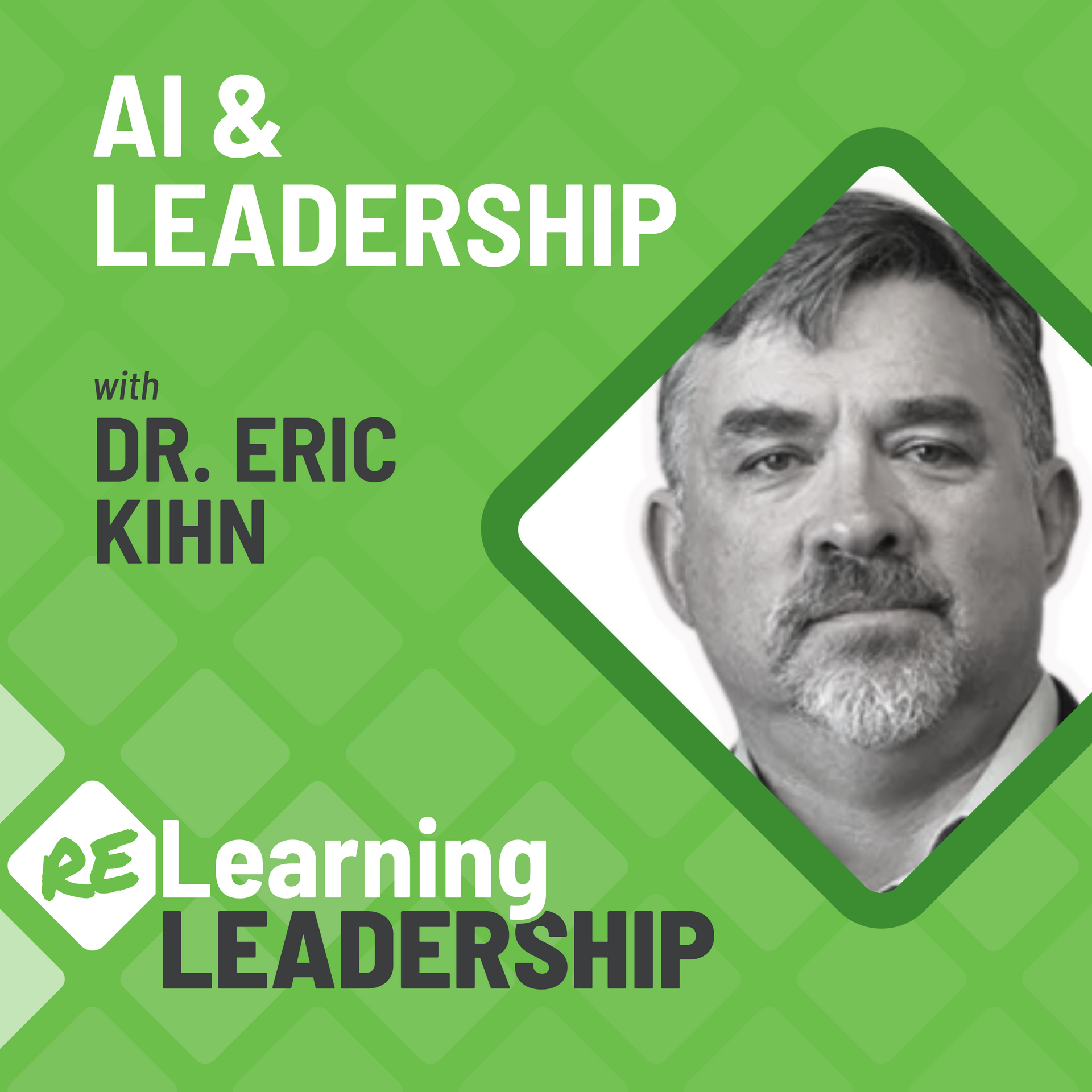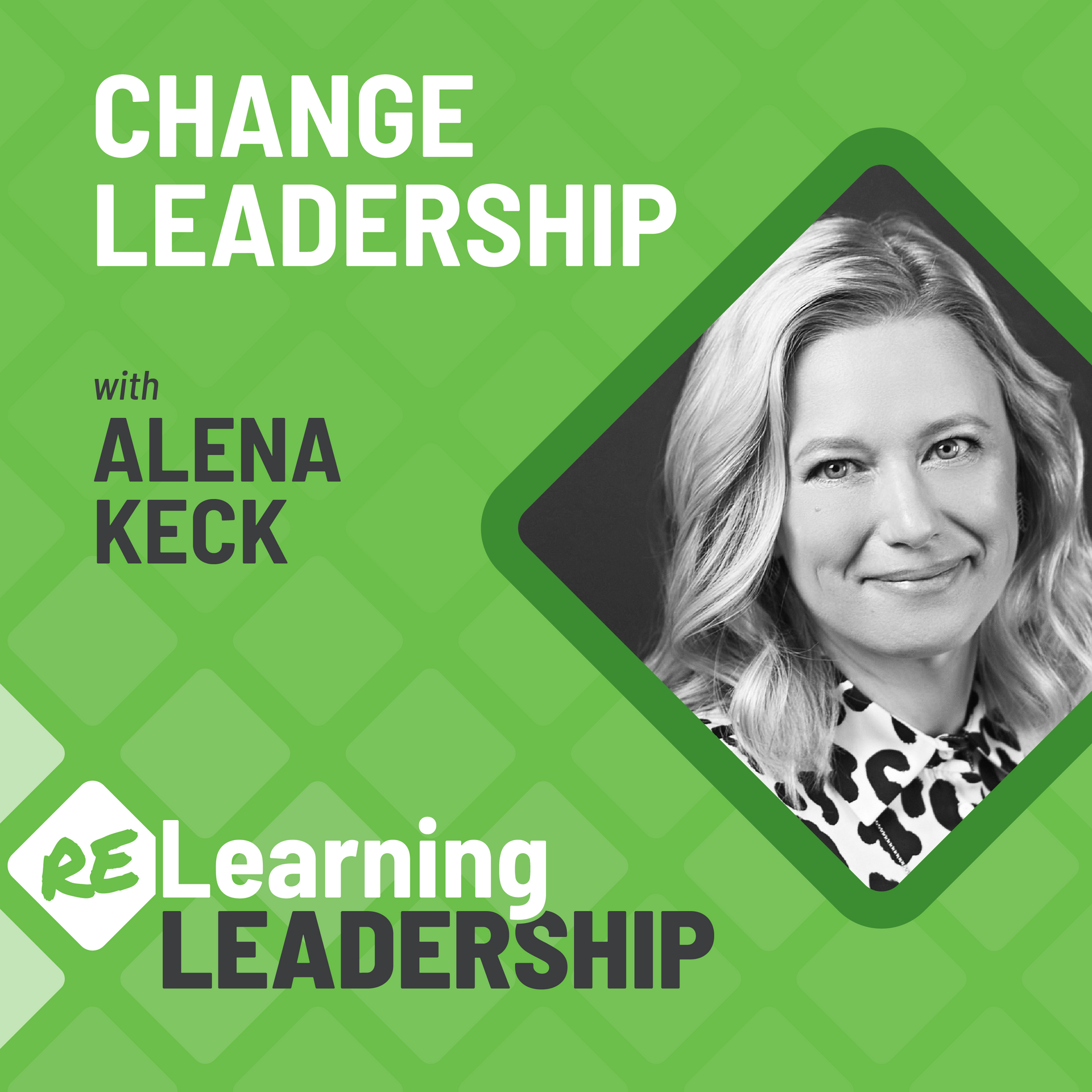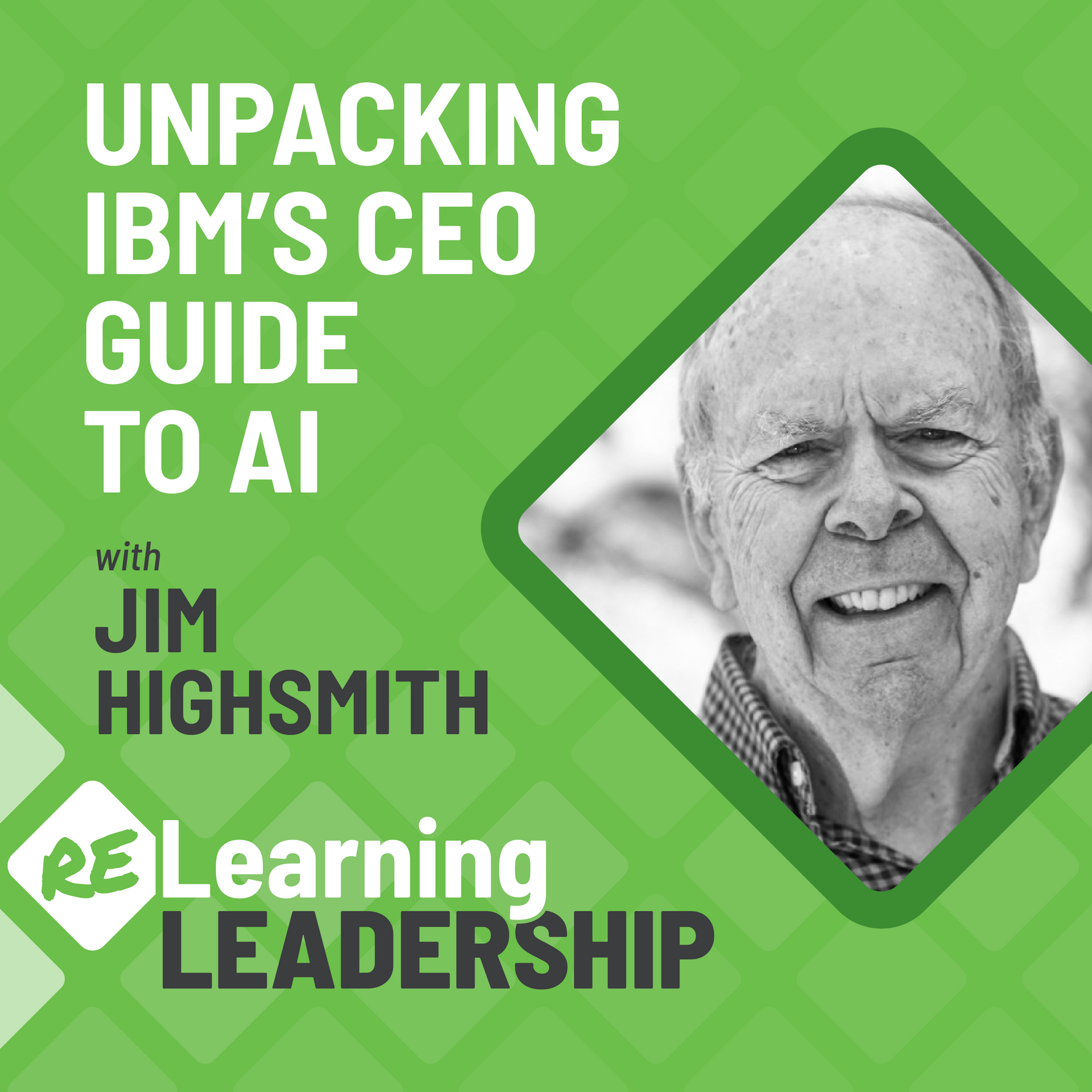11: Finding Your Purpose
What would you do if money didn't matter?
Andy Slain, a company man for 17 years in a well-paying managerial position decides to leave it all behind to pursue a path of purpose with no financial guarantees. Essentially answering his own question, “What would I do if money didn’t matter?”
Brad Swanson, a Leadership and Organization Coach, joins Pete to reflect on Andy’s story and share his own similar purpose-seeking work/life choices to help us all relearn how to be more purposeful about our own leadership journeys.
Andy Slain, Leadership and Professional Development Coach
Andy was formerly an IT Managing Director at Nelnet Business Solutions, Inc.
He started his career as an attorney, pivoted to become an executive leader of agile software development teams, and recently pivoted again into coaching. In addition to his law degree, he has a Master's degree in psychology and various professional credentials. He and his wife live in Rochester, Minnesota.
He loves to read, hike, and curry favor with his two feline overlords.
For more about his coaching profile, visit www.slaincoaching.com.
Connect with Andy
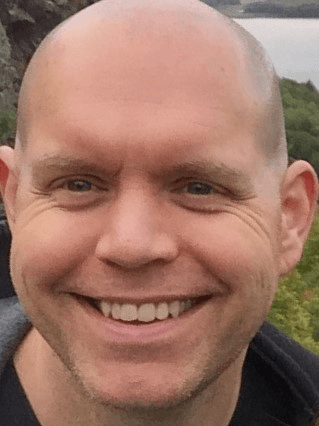
Brad Swanson, Leadership and Organizational Coach
Brad Swanson is a Leadership and Organizational Coach who guides companies to achieve sustainably better results using Lean & Agile principles.
He has been a trusted advisor for executives and organizations across the globe. He honed his own leadership skills as a Vice President in the consulting and software industries. Brad is a Certified Leadership Agility® 360 Coach, Certified Agile Leadership (CAL) Educator®, Certified Scrum Trainer® (CST), Certified Agile Coach (Certified Enterprise Coach® - CEC).
He is a member of the Agile Leadership Journey, a global federation of Leadership coaches.
Brad lives in Golden, Colorado wit
h his wife and two teenagers. He is an avid trail runner and backcountry skier.
To learn more about Brad, visit: www.agility11.com
Connect with Brad
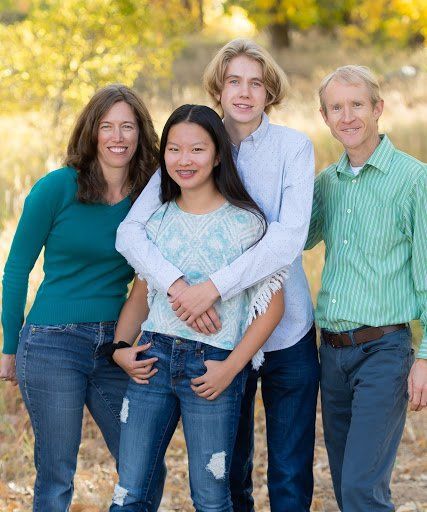
Relearning from this episode…
I am inspired by Andy’s story. His ability to not only identify and dream something that motivates him intrinsicly, but his ability to connect to it and realize it is a valuable lesson for all of us. I loved his quote:
“It's tempting to think of <this> as leaving leadership,
but actually I think of it as the next step in my leadership journey.”
Here is what I am taking away from Andy’s story…
First, be intentional about your journey. All of us are on a journey. Who is leading yours? Where are you headed? Many of us are on autopilot, waiting for someone or something to emerge. Take an explicit step back to reflect on the question, “What would I do if money didn’t matter?”
Second, create movement for deeper reflection. For Andy that was a walk in the woods with his wife. For Brad it is a long run in the mountains. And for myself it’s a bike ride. Movement provides physical and mental space to separate from the day-to-day and stimulates brain activity.
Third, reach out to a friend. While internal meditation and reflection can help clarify your own thinking, until you say it out loud, it remains under wraps, unchecked, and likely unfulfilled. Entrusting an ally as a sounding board will help to clarify, refine and inspire action.
And finally, don’t wait until everything is in place. Life will always be in flux. Work will always require attention. Enough will always feel just out of reach. Life is short. And money is only one dimension of value. There is no time like the present, and it will never return. Act now.
Be explicit about your journey.
Episode Transcript
Pete Behrens:
What would you do if money didn’t matter?
Welcome to another episode of Relearning Leadership, where we explore a specific leadership challenge and break it down to help improve your leadership, your organization… and even your personal life.
Today we meet Andy Slain, a company man for over 17 years in a well-paying managerial position, deciding to leave it all behind to pursue a path of passion, with no financial guarantees.
Andy Slain:
I had achieved a great deal of extrinsic or external success, but I hadn't internalized it. I wasn't doing something that I could honestly tell myself that I would do if the paychecks stopped. And I think that's always an interesting question, right? What would you do if money didn't matter?
Pete Behrens:
Following my discussion with Andy, I am joined by Brad Swanson, a leadership and organizational coach who shares similar choices throughout his career and reflects on Andy’s story.
Brad Swanson:
Andy sounded to me like he was on this default path of “Of course early retirement is the ultimate goal, right? Who wouldn't want that?” to then, on deeper reflection, realizing, “Well, wait a minute. I still need a sense of purpose.
Pete Behrens:
I’m Pete Behrens. Thank you for joining us today. Let’s dive in!
Welcome to the show, Andy!
Andy Slain:
Thanks, Pete. Thanks for having me.
Pete Behrens:
Well, I'd like to start out with, “Who is Andy Slain?” How would you answer that today?
Andy Slain:
I'm a personal development coach and a leadership coach. That is a fairly new career option for me. I recently left a position as a managing director overseeing a large software development
department that was kind of geographically dispersed. I had large teams in a couple of different cities and then
a large number of remote people as well. But in terms of a leadership journey, it was a real challenge for me. It was the first time in my career that I was managing people whose job I couldn't do. And so it really pushed me out of my comfort zone.
Pete Behrens:
Andy really jumped out to me. He was in our practice program this past year. And what was most intriguing to me was your explicit step back and reflection of your journey. And I want you to take us back a bit and walk us to this point where you decided to let go of all this and take a left turn. What happened to signal a new direction for you?
Andy Slain:
Sure. I've been a company man. Been with the same company for a little over 17 years. My wife and I happened to be on a vacation trip to Northern Minnesota. We were doing some hiking. We were on this very remote trailhead, and it was just that ideal situation. It was October, a crisp, clear fall day, and we were hiking through
this remote area. And I was just thinking to myself, “Wow, I want more of this. I want this freedom and what I'm feeling right now to be a bigger part of my life. And
that kicked off a couple months, honestly, of some pretty deep self-reflection. It just got me thinking a lot about what I wanted and what had motivated me up until that time. I think I had been very externally motivated, and what I realized during that period of self-reflection is that what I really wanted from my life was to discover that intrinsic motivation.
Pete Behrens:
I love your explanation here. The crisp morning in northern Minnesota. And you're taking me back—I grew up also in Minnesota. And one of our professors even said, “In the middle of winter, that's the one place he could hear God, when there's nothing else around. Walk us through that discernment process. What is this like, to think about everything you've done and maybe let go? And
that uncertainty of what's next.
Andy Slain:
I kind of started my thinking about early retirement, and am I ready to leave the workplace. That morphed a little bit into maybe not such an extreme step and maybe taking a sabbatical. And like I said, it
caused me to step back
and think about what I
really wanted. On some level, it felt like I was on the cusp of what should feel like this big achievement, either an early retirement or taking a sabbatical. But what I honestly felt was actually a sense of failure. And I had to spend a great deal of time looking at that and trying to figure out where that came from. And that's really where it hit me.
That for all these years, I had kind of always set out early retirement as a goal that I wanted to get to. And what I realized was that what I really wanted was something so intrinsically motivating, that from a work and a life perspective, that I didn't want to retire. And so that's what I'm after now, is trying to find just more of those things that I really enjoyed about my work and trying to maximize those things. Probably the favorite part of my job was the one-on-one interactions that I had with all of my direct reports. Having more of those sorts of interactions is what led me into coaching.
Pete Behrens:
Hm. Well, it sounds like you're less running
away from something and more running
to something. And the question was, what is that you're running to? Is it retirement? Is it a sabbatical? Is it something, as you talk about, intrinsically motivating. Anything particular help you in that discovery process?
Andy Slain:
I did definitely take a step back and think pretty carefully about what aspects of my job I enjoyed most. At the time, I was also reading David Rock's
Quiet Leadership, and that was really inspiring to me, his take on what it means
to be a good coach and to help other people think through their issues without giving them the answers.
And at the same time, I had a couple of people from within the company, but outside of my direct report group, that approached me wanting some mentoring and to talk through some issues that they were having in their lives. And it all kind of came together. That experience of them coming to me, my experience in the practice program, my own reflections about what really motivated me in my job, again just pushed me towards this idea that I wanted more of those things. More freedom and flexibility, more purpose, and more learning, and more development of myself.
Pete Behrens:
Did you find the meditative internal dialogue was more effective, or was it the conversation with your spouse? What was most effective for you?
Andy Slain:
It's
kind of a combination of those two things. It's interesting that you use the word meditative. I actually am a meditator. I sit for 45 minutes to an hour every morning, and so I do have that kind of reflective habit built into my routine. And what helps me is to do some of that internal self-reflection and then have that conversation. Yes, you know, conversation with my spouse definitely helped me clarify things. But I feel like, at least for me, I need to get things to a certain state internally before I'm ready to have that conversation. And then that conversation really helps crystallize things.
So
it was a conversation with my wife, that actually—the first time that I used that phrase, that “I feel like a failure.” I'm on the cusp of
what should feel like this great life victory.
And I felt like a failure.
Pete Behrens:
That's an interesting phrase, “failure.” You're not saying you're a failure in your job, you're saying you felt like a failure in the fact that you thought the job would lead you to this finish line. And all of the sudden, you realize it's not the finish line. Is that a better metaphor, to think about that failure feeling?
Andy Slain):
Yup, yup. Certainly not a failure in my job, but almost like I was letting myself down, like I was leaving work before I was ready to. It really caused me to step back and again take a look at how I define success. And I had achieved a great deal of extrinsic or external success, but I hadn't internalized it. I wasn't doing something that I could honestly tell myself that I would do if the paychecks stopped. And I think that's always an interesting question, right?
What would you do if money didn't matter? For me, it's coaching.
Pete Behrens:
Hm. You're way too early to let go of helping others. And I'm glad you found a passion here that allows you to do that in a creative way. Has there been something most difficult about this transition? What's been the hurdles you've had to overcome to make this a reality, to take it from a vision to something now that's in the past, that's actually happened?
Andy Slain:
I think it's just grappling with the transition of moving from the corporate environment
to a solo practitioner environment.
It's tempting to think of that as leaving leadership, but actually I think of it as the next step in my leadership journey. And kind of a getting-back-to-basics.
In the corporate context, it's very hard to set aside your own agenda. I had obligations, not just to my direct reports
and the teams below them, but
to the company and to the department. And to our executive team and shareholders.
And all of that conspires to really not be able to have a pure coaching conversation. A direct report might come to you with an issue, and you want to help them and do the best thing for them. But in the back of your mind, there's always that, “What's best for the company, and what does the department need?” And I felt like I was compromised a little bit, and I couldn't focus the way that I really wanted to on just what that individual needed.
And so, this transition is back-to-basics. Focusing on the individual, really focusing on deep listening, empathizing, helping people think through their problems instead of always being that expert and that mentor that has been there and done that, and could say, “Well, this is what has worked for me.” Because what has worked for me might not work for other people.
Pete Behrens:
I know it's still early for you, but any regrets yet?
Andy Slain:
No! It hasn't been very long since the transition—no, it's been great so far. I've been learning a lot. I really feel like the coaching that I've been doing and the coaching that I've been receiving is honestly just making me a better person. I feel different than I used to, and some of that might just be getting some distance from the corporate grind. But yeah, I'm just more content, more present, and a little more at peace.
Pete Behrens:
I like to hear that. Is there a particular clientele or a particular focus
that you would like to see, in terms of those people coming to you?
Andy Slain:
On my website, I talk about helping professionals navigate their life and work. And I think that's a pretty good summary. That's the area that I came from, and most of my experience is working around other professionals. And I think that's kind of where my sweet spot is.
Pete Behrens:
Take them up to northern Minnesota and throw ‘em in the lake.
Andy Slain:
Yup. [Laughs]
Pete Behrens:
Andy, I just want to say thank you for sharing your story. I know there's a lot of leaders out there who likely are caught in that spinning wheel. And sometimes it's hard to step back and reevaluate. What you're providing me is that inspiration. And that it really isn't ever too late to do that. Here we have a 17 year-plus company man thinking, “Hey, you know, if not now, when?” And, I think, to me, that's very inspirational. So thank you.
Andy Slain:
Well, I appreciate that. Thanks for having me on.
Pete Behrens:
Well, now I'd like to welcome Brad Swanson to the show. Brad is a leadership and organizational coach who guides companies to achieve better, sustainable results using Lean and Agile principles. Welcome to the show, Brad!
Brad Swanson:
Thanks for having me, Pete. Really glad to be here.
Pete Behrens:
I am pleased to have you on the show. And not because of your title, but actually because of some of the unique choices that I've seen you make through your career. Now, Brad and I met—for those of you that don't know—probably way back in 2006. What I've been jealous about—is not necessarily your corporate choices or what you've done as a coach, but the way you've merged some life choices in. And I wonder if you share with our audience a little bit about a few of those unique choices you've made through your career to balance some work-life aspects.
Brad Swanson:
Yeah, much like Andy, I went from having a job with a salary and a regular paycheck to taking that leap and going out on my own. That is a challenging and kind of scary thing to do. One of the first opportunities I took when I was out on my own was to work for an engagement over in Europe and then China. And I was lucky enough to actually take my family with me, so it was a fairly unique situation. So for about five months, I got to bring my family with me, live in some interesting places. I get some amazing coaching experience and kind of blend family life with work life in an adventurous way.
Pete Behrens:
You're reminding me of a conference I went to in Toronto. I brought my family on this trip, and I actually found that bringing my family on a work trip made both worse. I felt guilty when I was going to the conference, and then I'd feel guilty if I'm spending time with my family, both for opposite reasons. So, I'm wondering for you, in this work-life balance of going to Europe for a while, did you have that tension?
Brad Swanson:
I was fortunate in that my wife was able to do some work remotely. And my kids were young enough at the time that we could homeschool them as we went, so that worked out well. And another great thing about that is my colleagues also had some of their family with them. Many of us were also traveling with family. So outside of work we would also do things with some of the other families, so it didn't feel like it was a competition so much between the work time and the family time. It worked out great.
Pete Behrens:
It's almost like a band going on tour and everybody comes along for the ride and has some fun.
Brad Swanson:
Probably
not as exciting as a rock-and-roll tour, maybe. [Laughs] But it's still great.
Pete Behrens:
Well, let's move into Andy's story a minute here. What intrigued you most about what you heard in our interview?
Brad Swanson:
Yeah, I think what stood out with me most is—he was on this path, sort of the default path of, “Hey, wouldn't it be great if I could retire early and relax and get out of the corporate grind?” But
I was so intrigued by this idea that when he was out, I believe, on a hike, out in nature. He started reflecting and questioning, “Well, why is it that I have this goal of early retirement? What's really behind that?”
And that resonated with me because I also spend a lot of time out on the trails, and I find some of my best reflection, some of my best work-related thought happens there. And even work-related, you wouldn't think that going on a hike or a run could pay dividends in the work world, but I think it often does.
Pete Behrens:
Yeah, it's interesting. When I go for bike rides for two, three hours, people sometimes ask me, “What do you think about?” And I say, “You know, to be honest, I think about biking.” It's one of those things where I'm in enough pain that it pushes me to that meditative—that's the only thing that I can focus on. I know you run hard, because I've seen some of your Strava results. I do agree with the meditative side of that, that it does totally clear the mind of everything else that's going on, but you also find that to be a good point at which to start to think of some bigger aspects of life?
Brad Swanson:
Yeah, I do find that. It varies from one run to the next. Sometimes it's just, “Be present, focus in the moment, focus all about
the actual activity, and sometimes your mind just sort of goes to, “I'm trying to solve this challenge at work.” And being in motion and not having any other distractions enables some really interesting thinking to come out. I think there's some research that's been done around some of the best thinking happening when people are walking or even running, partly just from the increased blood flow, that it just sort of sparks energy in the brain. So yeah, it's a great time for me to reflect.
Pete Behrens:
Well, it brings me back to the Steve Jobs walking meetings. And I know one of the things in COVID I've been trying to do is look at my schedule for the day. “Is there one meeting I can do while I walk? Get out there and actually run a meeting that way.” And I do agree with you. I've had some of my best talks with my kids when we're hiking. It's that natural flow, where that reflective nature really starts to come through. And then the co-creative nature of the dialogue, I think, could be really powerful.
Brad Swanson:
Yeah, and it's a pattern I've seen with many of the best leaders I've worked with. They have some kind of a mindfulness or meditation practice, and oftentimes it may be associated with an activity like walking, running. I think Andy mentioned that specifically, that he has a very disciplined practice around meditation. It seems like a big investment of time, and I think a lot of folks don't realize the value of that until they've actually practiced it for themselves.
What also struck me was—he mentioned this combination of reflection but then conversation with his wife that led to this deeper realization of what he was really striving for with his goals that led to this new career direction. It wasn't purely personal reflection; it was also the conversation with others that clarified his thinking and ultimately helped him reach that clarity on the direction he wanted to go.
Pete Behrens:
That part reminded me a lot of what we teach with leadership and the growth and maturity of that expert mindset and getting into the details, moving towards a strategic thinking “Hey, let's think about goals and objectives.” To “Hey, let's actually take a step back. What are we doing? Why are we doing this? Are we on the right path?”
And that openness to accept the fact that we might not be on that path. Sounded like he took that leadership visioning process and then put it in the mirror. “Wait a second, why am I on this corporate hamster wheel, and is there a different hamster wheel or a different cage to go into?” And it sounds like you had a similar experience there in your shift from the corporate world.
Brad Swanson:
Yeah, that definitely brought back a lot of memories for me, because I did, at one point in my career, about a dozen years ago, make that same shift from having a steady paycheck to taking that leap. It is scary. I think, like Andy, I did a lot of reflection to really think about
“Well, what's important to me, what's going to motivate me, and what's going to bring me fulfillment?”
And ultimately, I think the safety net was, “Even if I don't succeed here, I'm going to learn a ton, and out of that learning, I'll be in a better position to maybe take another corporate type job afterwards. So I felt like I had other options. And I think that's important to remember. I've heard others, even on this podcast, talk about how, “If I take this leap of faith with this startup, even if the startup fails, I'll learn so much that I'll be in a much better position to get an even better job somewhere else afterwards.”
Pete Behrens:
Yeah, you're bringing up the Ameet story and the startup CEO. And yeah, I loved the way he reordered his values. And I know, when I look at my history and when I made those leaps—and I made a couple of leaps to startups, and then I made a leap to my own startup—it was those leaps where I felt like I was most alive. And I think I've heard the quote, “Life starts at the end of your comfort zone.”
What we're dealing with here is pushing those boundaries and creating opportunities. But the mindset shift, I guess, has to be, “The learning has to be more valuable than any financial outcome in this case.” And I think Andy said, “What would you do if money didn't matter?” And I just love that quote, because in a sense he's saying, “I might not make money at what I'm going to do, but it's sure gonna be a fun ride, I think!
Brad Swanson:
Yeah, I had some of the same thoughts. I didn't know how successful I might be going on my own, but it was what I valued personally and what brought me fulfillment that led me there. And again, I ultimately just decided it's worth taking that risk.
Pete Behrens:
Well, it sounds like his discernment process included a lot of other steps. Sabbatical, another type of job. And I know you've done some of those things, too, that I've been jealous about, some smaller steps that you can integrate life and integrate other ways of learning and growth with work. And I know there's a lot of people listening where it's like, “Hey, a new job's really not in the cards, so what can I take away from this?”
Brad Swanson:
Yeah, I have managed to take a couple of sabbaticals through my career, and I've been fortunate to be able to do that. In both cases, I let my company know well in advance that, “Hey, I have this big life goal, something that I've been aiming for for years and years.” And I'm talking about giving years of notice around, “Hey, at some point, a few years down the road, I plan to take some time off. And I would love it if you can accommodate that, and I also understand it if, as a company, you just can't.
Fortunately, I was able to make that work and find ways to backfill my role. I think it's worth asking. If you give your company enough notice, maybe that is a possibility. Sometimes the timing works out where, as I'm stepping out, it's the right timing for maybe somebody else to step in and sort of fill my role.
Pete Behrens:
Yeah, that sabbatical process—it's defined in some jobs. Educators, teachers, professors, they have a sabbatical system. Religious leaders have sabbatical every six, seven years. It's amazing it doesn't go into the corporate world more. And I think what you're describing is the self-sabbatical: be your own advocate to create these moments of reflection.
Brad Swanson:
I figure there's no harm in asking and trying to create that opportunity.
Pete Behrens:
There's a couple of words or phrases that really jumped out to me in Andy's discussion. First was the concept of failure, which was kind of an interesting thinking. He's failing if he retires now. The other one was this feeling of not being able to be himself, coach the way he wanted to coach people, given a corporate backdrop. Did either of those jump out to you?
Brad Swanson:
Yeah, that really struck me. Again, I think Andy sounded to me like he was on this default path of “Of course early retirement is the ultimate goal, right? Who wouldn't want that?” to then, on deeper reflection, realizing, “Well, wait a minute. I still need a sense of purpose. What is it that I like about what I'm currently doing?” I think it forced him to think more, not just about, “Yeah there's some of the corporate rat race that I don't like, and I want to get away from,” but “What are those essential pieces of my leadership role that energize me and that give me that purpose?”
Pete Behrens:
What I really liked—what he went through there was, “Wait a second, there's something I really enjoy about this work that I would do for no money, that I would do because it's something that gives me purpose, and I'm good at it, and people value it.
Brad Swanson:
Yeah, I think this reflection allowed him to create a vision for what would be the ultimate job for Andy, where I get to do the things I love and have these personal benefits of freedom and flexibility at the same time. So I think it's kind of like the alternative to retirement. If you ask my wife, she'd say, “I don't know how you can retire. You can't sit still for five minutes!” [Laughs] So it's I think it's about, “Well, maybe think about what would I do if I had all this free time? What would give me that purpose and meaning in my life?” So I think that's interesting to see how Andy came to that realization that it's not corporate or retirement. There’s other options there.
Pete Behrens:
So, one of the things that I thought was interesting is—Andy seemed to be shifting from kind of this external motivation of corporate to really more of that internal motivation of what was driving him. And what was valuable to him—I'm wondering how you reflected on that?
Brad Swanson:
Absolutely. Andy spoke about the conflicting agendas. As a manager, he's trying to coach folks, but there's this corporate agenda that kind of forms the backdrop. Just having that awareness is so key, in terms of keeping that in mind. And, I think, even with those corporate pressures, I think if you're open and honest about that with people, I think you can still be very effective. You can be perfectly honest about when the company goals are finding their way into that leadership conversation.
Pete Behrens:
You're taking me back to the days when I was a director and a VP. And I recall, at the time, how much I was molded by the system. And until I got out of the system, until I became a coach, until I started to work with organizations on the other side, I didn't really see it. It's almost like that frog in the water that's starting to boil. And I look back at those days, and I think, “I was totally somebody who could have changed what I was doing had I been more aware.” I wonder how many people inside these corporations are in that tide, and they feel helpless. And yet there's things you can do. There's steps you can take. You can start to challenge some of that system. But I imagine that takes a pretty strong, courageous person to do so.
Brad Swanson:
Yeah, I do. I think, as a leader, that might be the kind of conversation you need to have with your boss. I was just reflecting on Kim Scott's book, Radical Candor. She has this interesting concept of superstars and rock stars within an organization. The superstars being those people who are on a really fast growth trajectory, versus the rock stars who are—those are your steady performers. They're the people who maybe don't want to run that corporate hamster wheel to death and advance the corporate ladder, but they're going to do solid work.
But for the superstars, she describes that you need to accept that those people probably aren't going to stick with you forever. They're probably going to move on to a different job. And what you can do with folks like that is get the most out of them. Give them challenging goals, so they contribute the most they can to your organization while they're there. Maybe they'll have an advancement career within your organization, or they'll move on. But for whatever brief time those superstars are sort of in your orbit, get the most out of them. So I think that maybe is a way to balance the corporate goals with those individual coaching goals.
Pete Behrens:
Well is there anything you're rethinking through this process of reflecting on Andy’s story, and maybe even your own?
Brad Swanson:
One thing that strikes me is—I think I'm fairly good at having my own mindfulness practice. And usually, for me, it's when I'm out on a trail running. But what I think I'm not as good at is then having the conversation with someone else to clarify my thinking. So I think I need to get out of my own head sometimes and speak with a colleague, speak with my wife, speak with a client even, to talk about these ideas a little bit more and help hone them into something that's more clear and more actionable.
Pete Behrens:
Yeah, move it from a creative process to a co-creative process, likely coming up with some better outcomes, I think, is really great advice. Well, Brad, I just want to say thanks for joining us today. Thanks for sharing some of your personal journey, and hope we continue to collaborate in the future.
Brad Swanson:
Absolutely. It's been great to have this time with you, Pete. Thanks for the opportunity.
Pete Behrens:
I am inspired by Andy’s story. His ability to not only identify and dream something that motivates him intrinsically, but his ability to connect to it and realize it is a valuable lesson for all of us.
I loved his quote: “It's tempting to think of this as leaving leadership, but actually I think about it as the next step in my leadership journey.”
What did you learn from Andy’s story? For me, a few key takeaways emerged.
First, be intentional about your journey. All of us are on a journey. Who is leading yours? Where are you headed? Many of us are on autopilot, waiting for someone or something to emerge. Take an explicit step to reflect on the question, “What would I do if money didn’t matter?”
Second, create movement for deeper reflection. For Andy, that was a walk in the woods with his wife. For Brad, it’s a long run in the mountains. And for myself, it’s a bike ride. Movement creates physical and mental space to separate from the day-to-day and stimulate brain activity.
Third, reach out to a friend. While internal meditation and reflection can help clarify your own thinking, it remains under wraps, unchecked, and likely unfulfilled. Entrusting an ally as a sounding board will help to clarify, refine, and inspire action.
And finally, don’t wait for everything to be in place. Life will always be in flux. Work will always require attention. Enough will always feel just out of reach. Life is short. And money is only one dimension of value. There is no time like the present, and it will never return. So act now.
Be explicit about your journey.
Thanks for joining us today.
Relearning Leadership is the official podcast of the Agile Leadership Journey. It’s hosted by me, Pete Behrens, with analysis from our global Guide community. It’s produced by Ryan Dugan. With music by Joy Zimmerman. If you loved listening to this podcast, please leave us a review. And visit our website,
relearningleadership.show, for guest profiles, episode references, transcripts and comments, and more. And to (re)learn more about your own leadership, visit us at
agileleadershipjourney.com.
Explore:
Recent Episodes

